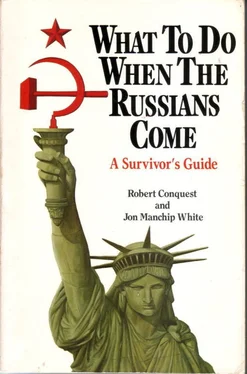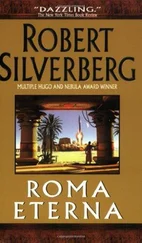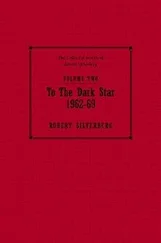Robert Conquest - What to Do When the Russians Come
Здесь есть возможность читать онлайн «Robert Conquest - What to Do When the Russians Come» весь текст электронной книги совершенно бесплатно (целиком полную версию без сокращений). В некоторых случаях можно слушать аудио, скачать через торрент в формате fb2 и присутствует краткое содержание. Город: New York, Год выпуска: 1984, ISBN: 1984, Издательство: Stein and Day Inc., Жанр: Публицистика, на английском языке. Описание произведения, (предисловие) а так же отзывы посетителей доступны на портале библиотеки ЛибКат.
- Название:What to Do When the Russians Come
- Автор:
- Издательство:Stein and Day Inc.
- Жанр:
- Год:1984
- Город:New York
- ISBN:0-8128-2985-9
- Рейтинг книги:3 / 5. Голосов: 1
-
Избранное:Добавить в избранное
- Отзывы:
-
Ваша оценка:
- 60
- 1
- 2
- 3
- 4
- 5
What to Do When the Russians Come: краткое содержание, описание и аннотация
Предлагаем к чтению аннотацию, описание, краткое содержание или предисловие (зависит от того, что написал сам автор книги «What to Do When the Russians Come»). Если вы не нашли необходимую информацию о книге — напишите в комментариях, мы постараемся отыскать её.
What to Do When the Russians Come — читать онлайн бесплатно полную книгу (весь текст) целиком
Ниже представлен текст книги, разбитый по страницам. Система сохранения места последней прочитанной страницы, позволяет с удобством читать онлайн бесплатно книгу «What to Do When the Russians Come», без необходимости каждый раз заново искать на чём Вы остановились. Поставьте закладку, и сможете в любой момент перейти на страницу, на которой закончили чтение.
Интервал:
Закладка:
Major crime rings that are nowadays unbreakable because of American legal provisions will not survive. But small-time crooks will seize the opportunities for bribery and fixing and acting as shady go-betweens offered by endless regulations and ill-paid bureaucrats. Soon, some will hardly be regarded as crooks at all by a population in desperate need of coping with the endless demands of officialdom. In fact, they will be treated almost as public benefactors. From time to time their actions will result in mass trials of fixers, crooks, and officials, leading in some cases to executions in the hope of a deterrent effect although without much long-term success.
So much for life as you will see it in your hometown. There will be many, in the uranium mines and elsewhere, who would return to it with joy. But what of the general prospects? At least, you may feel: “Better Red than dead.” Things will not turn out to be so simple, and you and your fellow citizens will not henceforth escape, as you had hoped, the horrors of war. As we have noted, the draft will be reinstituted, and young men will be called upon to serve a stint of two to three years in the “peacetime” American People’s Army. However, it is not likely that peace will prevail, and older men, if necessary to the age of forty and beyond, will also become liable for call-up, particularly in the event that China has not yet been attacked or that China has been attacked but is still carrying on a major guerrilla resistance. In that case, Moscow will be in great need of manpower. And, logically enough, Soviet aims will be best served by leaving Soviet troops to hold America and sending American young men, and the young of other Soviet satellites, to the war zone— under strict Soviet control, just as, at present, Cubans and East Germans are being used in Africa. In addition, if Chinese nuclear development has proceeded as projected, we may expect fusion bomb strikes on prime Soviet targets in America. In that case, America will not have avoided nuclear war by its surrender. But, in any case, such wars will become commonplace in the inevitable splits and schisms that will beset a communized, or largely communized, world.
If Chinese and other resistance is protracted, the Soviet army will be stretched so thin that the American People’s Army may also find itself committed against local patriots in the jungles of Africa and South America. All the same, it is even more likely that they will be sent to reinforce the pro-Soviet Vietnamese Communists as they fight the Chinese on the Mekong. Thus the war objectors of the late sixties may after all find themselves in Southeast Asia as the elderly conscripts of the early nineties.
Even a world effectively conquered by the USSR would be, as we said, beset by an endless cycle of schisms and rebellions, fought with the utmost ruthlessness and with every available modern weapon. As early as 1944, Milovan Djilas, who was then a leading Yugoslav Communist, was told by a Soviet general that “when Communism has triumphed throughout the entire world, then warfare will take on an ultimate bitterness.” We know that Stalin and the Communist chieftains of Eastern Europe planned an assault on Communist Yugoslavia itself, abandoned only because of their then overriding fear of the West. In Hungary in 1956, the first open clash came between two Communist-headed governments (together with a barely averted war between the USSR and Poland). In 1968, Communist Russia invaded Communist Czechoslovakia; and in the following year, full-scale battles between Communist Russia and Communist China were in progress on the Ussuri River, with all-out nuclear war a near thing. In 1978, the war between Communist Vietnam and Communist Cambodia occurred; and later the fighting between Vietnam and China. As the Soviet general told Djilas, eventually the proliferating sects and factions of communism “will undertake the reckless destruction of the human race in the name of the human race’s greater ‘happiness.’” You can be Red and dead!
The Soviet authorities, as they do in Russia today, will institute the most comprehensive and compulsory civil-defense programs. All civilians will be made to take part in regular drills and exercises. You will find these tedious and exhausting after your day’s work; but pay attention to them, and take them seriously. These are not theoretical undertakings.
Whether you are a soldier or a civilian, in the army or out of it, you will not be allowed, any more than the inhabitants of the Soviet Union are, to move about freely. Restrictions on travel are a fundamental component of Communist life. As in Russia, it will not be easy to obtain leave to move from one city to another or to relocate. You will be issued an identity card or “internal passport” that you will be required to carry at all times. It will contain your photograph and extensive personal data and will consist of several pages to provide room to stamp in the details of all your movements. (As we have seen, the whole working population will also be handed individual “labor books,” again with multiple pages, as your working record, including notes of any fines, warnings, admonishments, or disciplinary action taken against you. It will record each change of job, and when each book is filled up, it will be forwarded to the official archives before the issuing of a new one.)
If you are given permission to visit a strange town, particulars will be entered in your internal passport, and they will be noted by hotel receptionists or apartment-block caretakers for transmission to the local police station. Most readers will know already that in Communist countries all the rooms in the larger hotels are bugged and that major visitors are directed to such hotels. If you are a reasonably obscure personage, you should therefore avoid the big hotels and not only for economic reasons. In the smaller and cheaper ones, even the secret police do not have the resources for such action.
In Communist countries, and in America after the defeat, you will not expect your hotel, particularly one of the less expensive ones, to come up to the prewar American standard, and there are some items that you ought to get used to carrying with you if you are able to travel. These will include a tablet of soap, a clean towel, and a supply of toilet paper or the cut-up pieces of newspaper that for some time will do universal duty as toilet paper. Even the better hotels in Communist countries have had the plugs for the baths and basins stolen, so you might also take with you a couple of plugs of assorted sizes. An extra blanket and a tin of flea powder might also come in handy. In the hotels, as in most public buildings, you will not expect to find the elevators working, so be prepared to climb the stairs.
Your sense of isolation and depression in a strange town will be even greater than it is in your own, where at least you have your friends and your family and know your way around. In a strange town you will find the restaurants and places of amusement even drearier than at home.
If you do decide to leave your dismal room and go in search of whatever entertainment there might be, you could conceivably visit one of the local cinemas. The fare will be familiar. In the main feature, battalions of jolly Communists with shining faces, led by wise and stalwart Party members, may be shown ardently fulfilling the latest Five-Year Plan. You won’t find it enthralling, and you will feel uncomfortable sitting in the cinema practically alone, except for some young couples busy necking and some old people soundly snoozing. In any event, in the early days, the curfew will begin at eight or nine o’clock, so once you have swallowed your watery stew and acorn coffee in the State cafeteria, it will hardly be worth your while to wander further abroad.
In your gloomy room, you can switch on the television if any, or the radio. Most of the programs will consist of primitive propaganda of the type you avoided by not going to the cinema.
Читать дальшеИнтервал:
Закладка:
Похожие книги на «What to Do When the Russians Come»
Представляем Вашему вниманию похожие книги на «What to Do When the Russians Come» списком для выбора. Мы отобрали схожую по названию и смыслу литературу в надежде предоставить читателям больше вариантов отыскать новые, интересные, ещё непрочитанные произведения.
Обсуждение, отзывы о книге «What to Do When the Russians Come» и просто собственные мнения читателей. Оставьте ваши комментарии, напишите, что Вы думаете о произведении, его смысле или главных героях. Укажите что конкретно понравилось, а что нет, и почему Вы так считаете.












